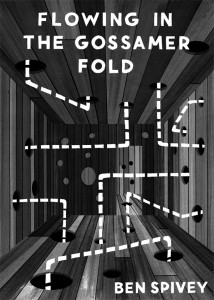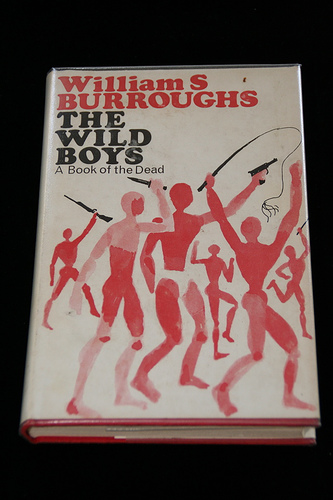Blake Butler
http://www.gillesdeleuzecommittedsuicideandsowilldrphil.com/
Blake Butler lives in Atlanta. His third book, There Is No Year, is forthcoming April 2011 from Harper Perennial.
http://www.gillesdeleuzecommittedsuicideandsowilldrphil.com/
Blake Butler lives in Atlanta. His third book, There Is No Year, is forthcoming April 2011 from Harper Perennial.

My first purpose in going to Europe was to play American music.
I started with this idea that sound could be obtained from sculptural material or actually from anything through reflections.
If you put yourself in a situation of unpredictability and then find that it’s completely possible to accept it, then you become an observer.
When you look at a score and you see that you are following the instructions and the way they are laid down, you are the composers’ helper.
Performing is very much like cooking: putting it all together, raising the temperature.
I try to find out what’s there and not to make it do what I want but to, you know, release what’s there.
An electronic component can seem to have a personality very much in the same way I try to make loudspeakers have a special voice.
In a sense there was only one principle of sound generation, so I decided to influence the sound output to make as many different kinds of sounds as I could. If I had 12 loudspeakers, I could produce 12 different sounds from the same input material.
Loudspeakers should be made to be destroyed and… disposable.
If you don’t like the sound that the computer produces, then it’s a matter of making it do something that’s interesting to you. And I’ve done it, upon occasion.
I’ve always felt that there’s a point where a piece seems to be alive, that is, living. And that’s the point where I know the composition is finished.
When the sound appears to be live in the space, then it’s free; it seems to flow by itself and not to be caused by some specific intention, especially of an intellectual nature.
As long as there are people who realize that machines are not interesting and that behind any music there has to be a live person, I think that we might be able to overcome the omnipresence of synthesizers and keyboards.
You missed the live random reading, but you can still check out the books I read from (the recorder malfunctioned so there is no video archive):
The Mechanics of Homosexual Intercourse by Lonely Christopher [Little House on the Bowery]
Nick Demske by Nick Demske [Fence]
Orange Juice by Timothy Willis Sanders [Awesome Machine]
Asunder by Robert Lopez [Dzanc]
Ventrakl by Christian Hawkey [UDP]
The Size of the Universe by Joseph Cardinale [FC2]
Glass is Really a Liquid by Bruce Covey [No Tell]
7 Controlled Vocabularies by Tan Lin [Wesleyan]
Avatar by Evan Lavender-Smith [Six Gallery]
This week at Five Chapters, a previously unpublished story by Barry Hannah: “Lastward, Deputy James”

Some of the most singular moments in understanding come on as if being shook: a presence entering the body unto some new consideration of how that entrance might occur. One kind of a map of a version of one’s self might be determined by considering among the terrain of the body a series of approached organs; objects imbibed, in what order, how one’s own output is affected; what is out there; what is. Seeing does this. Language, more indirectly, does this, too: entering as symbols and networks of orchestrations. Some strings of language, as well, leave in their wake a total reinvention of creation as an act, iconing on the map of self, and many selves; updating or widening or recalcifying what any kind of words can, could, or should do.
I can remember with unusual clarity the feeling in me the first time I read David Foster Wallace’s “Mister Squishy.” It was published under the name Elizabeth Klemm in the 5th issue of McSweeney’s in 2000, but by the time the magazine reached my hands I’d already heard on the Wallace listserv that this rather lengthy piece of fiction could only ever be written by him; there could have been nobody else. I was already a rabid Wallace freak; I’d pretty much begun writing fiction as a direct byproduct of reading Infinite Jest, and since then become obsessed. I read this story, long as perhaps 3 normal stories, on a futon in a house in one sitting under a skylight with legs crossed, already ready to be lit. And yet, the particular instance of “Mister Squishy,” even having then been well versed in a way that somehow placed the author’s presence in my daily thoughts (which has not since then stopped), rendered in me that the first time something different even than what I’d been ready to expect: some odd confabulation of provocation, confusion, inundated awe; a feeling rare not only for any kind of language, but particularly for a shorter work. This was something singular beyond even the already neon body of Wallace’s work in constellation, and in particular, beyond the confines of what a story as a “story,” or a novel even, or text as text, traditionally operationally assists to construe.
Since then I’ve read the 63 pages of “Mister Squishy” at least a dozen times. I’m not sure even still I can begin to wholly how to parse the innumerable levels of its moves, using tactics and employments that continue shifting with each reconsideration and further study in the way a Magic Eye painting might if it could get up and walk around: a kind of high water mark of contained language and ambition, since then, now ten years later, still uncontested in the ways of invoking the uninvocable, the void. It is a station, I believe, should be reexamined; it is, in many ways, a kind of key to a beyond, both in the content of the story, and the method of its opening a new kind of affect in languageground, one that still has yet to be, these years later, fully inculcated, or because of time’s way, even unpacked.
Barnes & Noble is running a 50% off all Criterion Collection releases; I think it ends on Friday. Be careful. I’m buying at least Antichrist, Last Year at Marienbad, and House. What will you get?
 Earlier this summer, Blue Square Press released their first title, Ben Spivey’s Flowing in the Gossamer Fold. Told in a series of mostly short, alternatingly Lutz-real and dreamlike passages, the book contains an interior logic and realm of imagery somewhere on the cusp of no realm, fresh and familiar at the same time. Over the past week or so, I asked Ben about the book’s creation, his influence, and more about the future of this new press over email.
Earlier this summer, Blue Square Press released their first title, Ben Spivey’s Flowing in the Gossamer Fold. Told in a series of mostly short, alternatingly Lutz-real and dreamlike passages, the book contains an interior logic and realm of imagery somewhere on the cusp of no realm, fresh and familiar at the same time. Over the past week or so, I asked Ben about the book’s creation, his influence, and more about the future of this new press over email.
Let’s start at the beginning: How did Gossamer begin in you as an idea?
It began as a drowning feeling. When I was first thinking about Gossamer I knew I wanted to tell a story about a man losing everything he was comfortable with. I knew how I wanted it to end, in fact I had the last sentence written in the first draft, the line was never changed.
So your writing the novel was all movement toward that last sentence? How did the moves reveal themselves? Over what time?
I started writing the novel in February of 2009 and I finished it sometime around March of this year. The moves revealed themselves as pieces to a puzzle. I kept a Moleskine journal with me at all times, jotting down ideas. For that year I never stopped thinking about Malcolm. A lot of the time I put into the novel was spent arranging the scenes and the moments, moving and cutting chapters, paragraphs, sentences. The beginning was originally the middle. I was working toward that last sentence; I knew that there was nothing beyond it.
1. Shya Scanlon’s Forecast has been launched at Flatmancrooked. “The year is 2212, the weather is out of control, and Seattle is being rebuilt with electricity generated from negative human emotion.”

2. Lindsay Hunter has a rad new freakstory at 52 Stories: Three Things You Should Know About Peggy Paula.
3. At Comics Alliance, “The Monsters of H.P. Lovecraft’s Cthulu Mythos, As Drawn by Children”

4. New issue of Notnostrums.

1. Metazen is putting together an ebook that will then be sold for Christmas, with all proceeds going to an orphanage in Cambodia. Check it out, submit, and consider picking up a copy in support when it arrives.
2. Fence has just unveiled their 3 newest titles: Nick Demske by Nick Demske; The Network by Jena Osman; English Fragments: A Brief History of the Soul by Martin Corless-Smith; all of which look quite excellent and are available as a package now for $30.
3. Mike Topp’s Sasquatch Stories is out now from Publishing Genius, with cover art by Tao Lin.
 I realized last night how I’ve never gotten over William Burroughs; how maybe more than any syllable maker I’ve read in my life it’s been him I’ve been mimicking in mind to large degree; him one of the first of all those I still read now still coming out since seventeen in more sentences than I should like to admit; how is indexed me somehow; how I could argue with myself that if every word I write is trying to match against or kill some father, it is him, even if by now I can’t always actually remember a lot about what he wrote beyond textures, images, residues, ideas.
I realized last night how I’ve never gotten over William Burroughs; how maybe more than any syllable maker I’ve read in my life it’s been him I’ve been mimicking in mind to large degree; him one of the first of all those I still read now still coming out since seventeen in more sentences than I should like to admit; how is indexed me somehow; how I could argue with myself that if every word I write is trying to match against or kill some father, it is him, even if by now I can’t always actually remember a lot about what he wrote beyond textures, images, residues, ideas.
I read Naked Lunch the first time having got caught gut-deep in the Beats, like so many did, when a friend brought a tape of Ginsberg reading “America” in to play for our American Lit class in 10th grade. We had to get permission slips signed before we were allowed to listen because he dropped the F-bomb and dissed on everything seemingly elemental about the suburban neighborhoods surrounding Joseph Wheeler High School (named, I heard whispered more than a few times back then, for a founding member of the Klan). The high school I went to was a weird mix of hood and upper middle class; there were fights at least a couple times a week; I vividly remember walking one day to the senior lot and seeing a truckbed full of dudes in masks with weapons coasting through without an inch of other motion: they didn’t find who they were looking for; or maybe they were simply there to be an image burned into my head. But more than them, and more than many things, there were these freakshows of strange language suddenly appearing in the half-slept muddle of all those other high school era books.